
Some say volatility, rather than debt, is the best way to think about risk as an investor, but Warren Buffett famously said that 'Volatility is far from synonymous with risk.' So it seems the smart money knows that debt - which is usually involved in bankruptcies - is a very important factor, when you assess how risky a company is. We note that Evoke Pharma, Inc. (NASDAQ:EVOK) does have debt on its balance sheet. But is this debt a concern to shareholders?
Why Does Debt Bring Risk?
Debt is a tool to help businesses grow, but if a business is incapable of paying off its lenders, then it exists at their mercy. If things get really bad, the lenders can take control of the business. However, a more frequent (but still costly) occurrence is where a company must issue shares at bargain-basement prices, permanently diluting shareholders, just to shore up its balance sheet. Of course, debt can be an important tool in businesses, particularly capital heavy businesses. When we examine debt levels, we first consider both cash and debt levels, together.
Check out our latest analysis for Evoke Pharma
What Is Evoke Pharma's Debt?
The image below, which you can click on for greater detail, shows that at June 2021 Evoke Pharma had debt of US$5.00m, up from US$2.10m in one year. But it also has US$16.7m in cash to offset that, meaning it has US$11.7m net cash.

A Look At Evoke Pharma's Liabilities
The latest balance sheet data shows that Evoke Pharma had liabilities of US$6.23m due within a year, and liabilities of US$5.36m falling due after that. On the other hand, it had cash of US$16.7m and US$198.4k worth of receivables due within a year. So it actually has US$5.33m more liquid assets than total liabilities.
This short term liquidity is a sign that Evoke Pharma could probably pay off its debt with ease, as its balance sheet is far from stretched. Succinctly put, Evoke Pharma boasts net cash, so it's fair to say it does not have a heavy debt load! There's no doubt that we learn most about debt from the balance sheet. But it is future earnings, more than anything, that will determine Evoke Pharma's ability to maintain a healthy balance sheet going forward. So if you're focused on the future you can check out this free report showing analyst profit forecasts.
It seems likely shareholders hope that Evoke Pharma can significantly advance the business plan before too long, because it doesn't have any significant revenue at the moment.
So How Risky Is Evoke Pharma?
Statistically speaking companies that lose money are riskier than those that make money. And in the last year Evoke Pharma had an earnings before interest and tax (EBIT) loss, truth be told. And over the same period it saw negative free cash outflow of US$8.0m and booked a US$9.3m accounting loss. Given it only has net cash of US$11.7m, the company may need to raise more capital if it doesn't reach break-even soon. Overall, its balance sheet doesn't seem overly risky, at the moment, but we're always cautious until we see the positive free cash flow. The balance sheet is clearly the area to focus on when you are analysing debt. But ultimately, every company can contain risks that exist outside of the balance sheet. We've identified 4 warning signs with Evoke Pharma (at least 1 which can't be ignored) , and understanding them should be part of your investment process.
When all is said and done, sometimes its easier to focus on companies that don't even need debt. Readers can access a list of growth stocks with zero net debt 100% free, right now.
If you're looking to trade Evoke Pharma, open an account with the lowest-cost platform trusted by professionals, Interactive Brokers.
With clients in over 200 countries and territories, and access to 160 markets, IBKR lets you trade stocks, options, futures, forex, bonds and funds from a single integrated account.
Enjoy no hidden fees, no account minimums, and FX conversion rates as low as 0.03%, far better than what most brokers offer.
Sponsored ContentValuation is complex, but we're here to simplify it.
Discover if Evoke Pharma might be undervalued or overvalued with our detailed analysis, featuring fair value estimates, potential risks, dividends, insider trades, and its financial condition.
Access Free AnalysisThis article by Simply Wall St is general in nature. We provide commentary based on historical data and analyst forecasts only using an unbiased methodology and our articles are not intended to be financial advice. It does not constitute a recommendation to buy or sell any stock, and does not take account of your objectives, or your financial situation. We aim to bring you long-term focused analysis driven by fundamental data. Note that our analysis may not factor in the latest price-sensitive company announcements or qualitative material. Simply Wall St has no position in any stocks mentioned.
Have feedback on this article? Concerned about the content? Get in touch with us directly. Alternatively, email editorial-team (at) simplywallst.com.
About NasdaqCM:EVOK
Evoke Pharma
Operates as a specialty pharmaceutical company that focuses on the development and commercialization of drugs for the treatment of gastroenterological disorders and diseases.
High growth potential with excellent balance sheet.
Market Insights
Community Narratives




